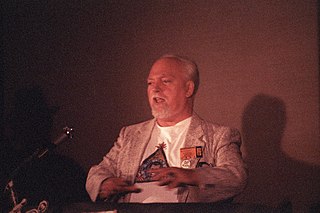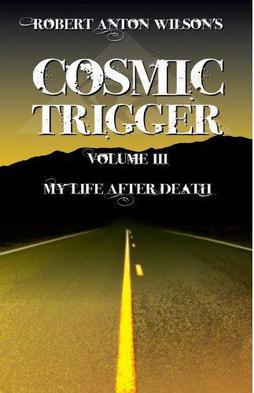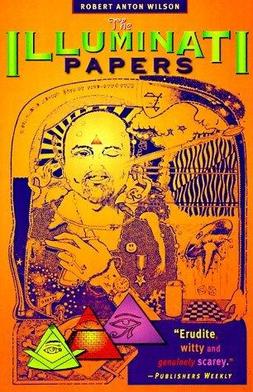
Discordianism is a belief system based around Eris, the Greek goddess of strife and discord, and variously defined as a religion, new religious movement, virtual religion, or act of social commentary; though prior to 2005, some sources categorized it as a parody religion. It was founded after the 1963 publication of its holy book, Principia Discordia, written by Greg Hill with Kerry Wendell Thornley, the two working under the pseudonyms Malaclypse the Younger and Omar Khayyam Ravenhurst.

Robert Anton Wilson was an American author, futurist, psychologist, and self-described agnostic mystic. Recognized within Discordianism as an Episkopos, pope and saint, Wilson helped publicize Discordianism through his writings and interviews. In 1999 he described his work as an "attempt to break down conditioned associations, to look at the world in a new way, with many models recognized as models or maps, and no one model elevated to the truth". Wilson's goal was "to try to get people into a state of generalized agnosticism, not agnosticism about God alone but agnosticism about everything."

Timothy Francis Leary was an American psychologist and author known for his strong advocacy of psychedelic drugs. Evaluations of Leary are polarized, ranging from bold oracle to publicity hound. According to poet Allen Ginsberg, he was "a hero of American consciousness", and writer Tom Robbins called him a "brave neuronaut". During the 1960s and 1970s, Leary was arrested 36 times. President Richard Nixon called him "the most dangerous man in America".

The Illuminatus! Trilogy is a series of three novels by American writers Robert Shea and Robert Anton Wilson, first published in 1975. The trilogy is a satirical, postmodern, science fiction–influenced adventure story; a drug-, sex-, and magic-laden trek through a number of conspiracy theories, both historical and imaginary, related to the authors' version of the Illuminati. The narrative often switches between third- and first-person perspectives in a nonlinear narrative. It is thematically dense, covering topics like counterculture, numerology, and Discordianism.
"Fnord" is a word coined in 1965 by Kerry Thornley and Greg Hill in the Discordian religious text Principia Discordia. It entered into popular culture after appearing in The Illuminatus! Trilogy (1975) of novels written by Robert Shea and Robert Anton Wilson. Here, the interjection "fnord" is given hypnotic power over the unenlightened, and children in grade school are taught to be unable to see the word consciously. For the rest of their lives, every appearance of the word subconsciously generates a feeling of unease and confusion which prevents rational consideration of the text in which it appears.
The eight-circuit model of consciousness is a holistic model originally presented as psychological philosophy by Timothy Leary in books including Neurologic (1973) and Exo-Psychology (1977), later expanded on by Robert Anton Wilson in his books Cosmic Trigger (1977) and Prometheus Rising (1983), and by Antero Alli in his books Angel Tech (1985) and The Eight-Circuit Brain (2009), that suggests "eight periods [circuits]" within the model. The eight circuits, or eight systems or "brains", as referred by other authors, operate within the human nervous system. Each corresponds to its own imprint and subjective experience of reality. Leary and Alli include three stages for each circuit, detailing developmental points for each level of consciousness.
The 23 enigma is a belief in the significance of the number 23. The concept of the 23 enigma has been popularized by various books, movies, and conspiracy theories, which suggest that the number 23 appears with unusual frequency in various contexts and may be a symbol of some larger, hidden significance. A topic related to the 23 enigma is eikositriophobia, which is the fear of the number 23.

Gregory Hill, better known by the pen name Malaclypse the Younger, was an American author. He is listed as author of the Principia Discordia, which was written with Kerry Wendell Thornley and others. He was also adapted as a character in The Illuminatus! Trilogy (1975). During the early years of circulation of the Principia Discordia, rumors claimed that the author of the book was Richard Nixon, Timothy Leary, or Robert Anton Wilson; or that the book and Malaclypse the Younger were both fictional inventions of Robert Anton Wilson, as with Abdul Alhazred's Necronomicon.

Cosmic Trigger II: Down to Earth is the second book in the Cosmic Trigger series, a three-volume autobiographical and philosophical work by Robert Anton Wilson.

Cosmic Trigger III: My Life After Death is the third book in the Cosmic Trigger series, a three-volume autobiographical and philosophical work by Robert Anton Wilson.

The Illuminati Papers is a collection of essays and other works by Robert Anton Wilson first published in 1980 (ISBN 1-57951-002-7).

Founded by Adam Weishaupt in Bavaria in 1776, the Illuminati have been referred to in popular culture, in books and comics, television and films, and games. A number of novelists, playwrights and composers are alleged to have been Illuminati members and to have reflected this in their work. Early conspiracy theories surrounding the Illuminati have inspired various creative works, and continue to do so.

The Book of Lies is a book written by English occultist and teacher Aleister Crowley and first published in 1912 or 1913. As Crowley describes it: "This book deals with many matters on all planes of the very highest importance. It is an official publication for Babes of the Abyss, but is recommended even to beginners as highly suggestive."

The Principia Discordia is the first published Discordian religious text. It was written by Greg Hill with Kerry Wendell Thornley and others. The first edition was printed using Jim Garrison's Xerox printer in 1963. The second edition was published under the title Principia Discordia or How The West Was Lost in a limited edition of five copies in 1965. The phrase Principia Discordia, reminiscent of Isaac Newton's 1687 Principia Mathematica, is presumably intended to mean Discordant Principles, or Principles of Discordance.
The following is a list of works by Timothy Leary. The majority of Leary's works were put into the public domain by his estate in 2009.

The term chapel perilous first appeared in Sir Thomas Malory's Le Morte d'Arthur (1485) as the setting for an adventure in which sorceress Hellawes unsuccessfully attempts to seduce Sir Lancelot. T. S. Eliot used it symbolically in The Waste Land (1922). Dorothy Hewett took The Chapel Perilous as the title for her autobiographical play, in which she uses "the framework of the Arthurian legend, Sir Lancelot, to create a theatrical quest of romantic and epic proportions."

John Higgs is an English writer, novelist, journalist and cultural historian. The work of Higgs has been published in the form of novels, biographies and works of cultural history.
Alistair Fruish is an English filmmaker, writer and novelist, born in Northampton.
Daisy Eris Campbell, is a British writer, actress and theatre director. Daughter of actor and director Ken Campbell and actress and therapist Prunella Gee. She staged The Warp, a revival of Neil Oram's 24-hour play at The Everyman Theatre, Liverpool. Campbell also adapted Robert Anton Wilson’s cult autobiographical book Cosmic Trigger for the stage. She played the role of her mother in the play. Cosmic Trigger is a kind of sequel to her father's adaptation of Robert Anton Wilson's Illuminatus! Allegedly, Daisy was conceived during the original production of Illuminatus! In part, the play of Cosmic Trigger deals with the production of Ken Campbell's adaptation of Illuminatus! in Liverpool in 1976.













